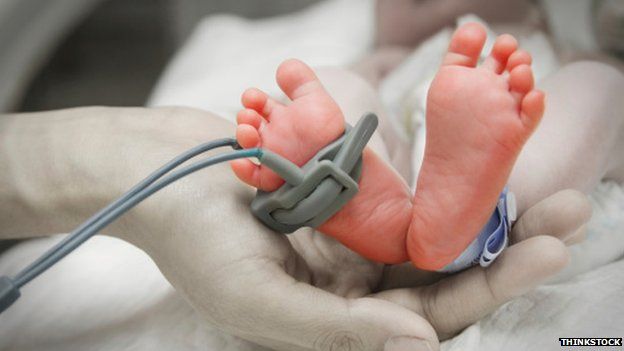Why the UK has a high child death rate
- Published

The UK has one of the most advanced health systems in the world, but one of worst child mortality rates in Western Europe.
In this week's Scrubbing Up, Dr Ingrid Wolfe of the Royal College of Paediatrics and Child Health and lead author of a report published this week entitled 'Why Children Die' examines why the UK is lagging behind its European counterparts and suggests what we should be doing about it.
Around 6,000 children and young people die a year in the UK. Over two-thirds of these are aged under five, and the majority are under the age of one.
These statistics alone don't tell us much.
However, by looking at where the UK sits compared to other European countries, we get a much clearer picture of how well we're actually performing.
Lagging behind
A paper published this week in the Lancet reveals that the UK is bottom of the Western European league table when it comes to child mortality rates of under-fives.
We have higher rates than countries including Cyprus, Greece, Spain and Portugal and are more in-line with Poland and Serbia than with the high performing countries such as Iceland, Sweden and Germany.
Even if you don't compare the UK to other individual countries and instead look at the Western European average, the number of under-fives deaths is around 25% higher in the UK.
Perhaps even more worryingly, despite overall child mortality rates declining in the UK, the rate of improvement is slower than other Western European countries.
The Lancet paper shows that by 2030 we'll still be lagging behind other European countries.
So we know for a fact that we are performing badly and we're not improving quickly enough.
But why is the UK lagging behind?
Is it the healthcare system and quality of care our children receive, or are there lifestyle factors at play? What is it that makes other countries better than us?
In reality, it's a combination of factors; but just because the causes are complex that shouldn't stop us looking for solutions.
No coincidence
This week the Royal College of Paediatrics and Child Health launched a report - Why Children Die - that dug deeper into what it is children die from and which of these deaths can be prevented.
Our overarching conclusion was that risk of child death disproportionally affects poorer families.
When you compare Britain to the rest of Europe, we are one of the most unequal societies, with a growing gap between rich and poor.
It is no coincidence that our child mortality rates are also the worst.
Our analysis of the causes of child deaths shows many deaths in under-fives are due to risky behaviours (such as smoking) during pregnancy, which is more common among women who are socially disadvantaged.
Drinking during pregnancy is another risk factor, as is children being around second-hand smoke and unsafe sleeping - all of which can contribute to premature death.
So what do we want to see?
The focus has to be on reducing the growing gap between rich and poor - put simply, countries that spend more on social protection have lower child mortality rates.
Stark message
Social protection means things like helping poor families to make sure they have safe secure housing, enough healthy food to eat, and money to buy shoes for their children.
But we also need to focus on improving health of mothers, preventing babies being born too early, and making sure all healthcare professionals who look after babies are better trained to spot early when a child may become seriously ill and act quickly.
Our report 'Why Children Die' recommends:
•Withdrawing the new cap on welfare spending and implementing a safety net so that the rising living costs do not hit families with the lowest incomes
•Action across the health system to promote smoking cessation in pregnancy and before
•Targeted awareness campaigns for safe sleeping to prevent sudden infant death syndrome
•Better training for healthcare staff: All frontline health professionals involved in the acute assessment of children and young people should be confident and competent to recognise a sick child and know what to do about it.
The messages are stark; living in an unequal society raises the risk of children dying. It's time to put piecemeal policies aside and bring the UK up to standard of the best when it comes to the health of our children.
- Published2 May 2014